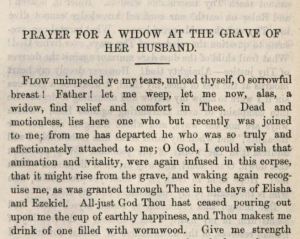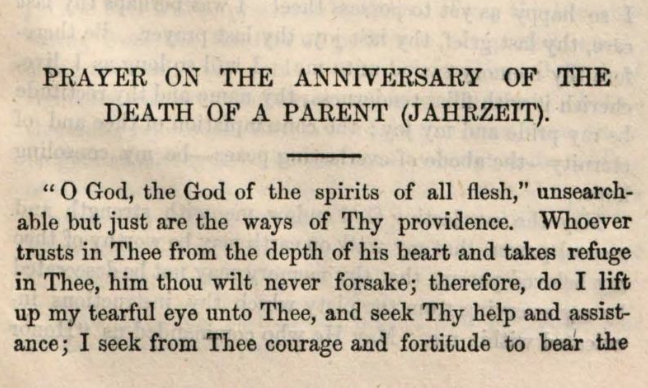Contributor(s): Shared on: 15 June 2020 under the Creative Commons Zero (CC 0) Universal license a Public Domain dedication Categories: Tags: | Contribute a translation | Source (English) |
|---|
|
Flow unimpeded ye my tears, unload thyself, O sorrowful breast! Father! let me weep, let me now, alas, a widow, find relief and comfort in Thee. Dead and motionless, lies here one who but recently was joined to me; from me has departed he who was so truly and affectionately attached to me; O God, I could wish that animation and vitality, were again infused in this corpse, that it might rise from the grave, and waking again recognise me, as was granted through Thee in the days of Elisha and Ezekiel. All-just God Thou hast ceased pouring out upon me the cup of earthly happiness, and Thou makest me drink of one filled with wormwood. Give me strength O Father, that I do not sink; grant that the hope of resurrection may keep me erect. Assist me, O God, Thou who art the “Judge of the Widows,” and be my staff and my stay. And thou dear departed, walk sorrowless in yonder regions where no night will follow thy day, and no grief thy joy. For an endless joyful union now hopes my mourning heart, as the ties which bind sympathising soul to soul, death cannot sever; yea, I shall meet thee again, as soon as upon my night also eternal day shall follow. Amen. |
“Prayer for a Widow at the Grave of Her Husband” was first published in Marcus Heinrich Bresslau’s collection of teḥinot, Teḥinot Banot Yisrael: Devotions for the Daughters of Israel (1852). Source(s)
 Marcus Heinrich (also Mordecai Ḥayyim/Hyman/Heyman) Bresslau (ca. 1808-15 May 1864) was a Hebraist and newspaper editor. Born in Hamburg, he settled in England when young. For some time from 1834 he was Baal Ḳoreh (reader) at the Western Synagogue. He then taught Hebrew at the Westminster Jews’ Free School and went on to tutor privately. A maskil, he became involved with M. J. Raphall’s Hebrew Review and Magazine of Rabbinical Literature (1834-6). In October 1844 he was appointed editor of the relaunched Jewish Chronicle by proprietor Joseph Mitchell. Prickly and quarrelsome, he resigned in July 1848 but returned in around September. He remained until about October 1850. After Mitchell’s death in June 1854 he became proprietor (his middle name appearing as Heyman) and edited it until February 1855 when new proprietor Abraham Benisch succeeded him. Bresslau, who tried vainly to revive the Hebrew Review, wrote Hebrew poetry, produced a Hebrew grammar and a Hebrew dictionary, and translated various Hebrew manuscripts in the Bodleian Library. Bresslau compiled (we think) the first compilation of teḥinot in English for women. (Much of this information via Bresslau's entry in The Palgrave Dictionary of Anglo-Jewish History) Aharon Varady (M.A.J.Ed./JTSA Davidson) is a volunteer transcriber for the Open Siddur Project. If you find any mistakes in his transcriptions, please let him know. Shgiyot mi yavin; Ministarot naqeni שְׁגִיאוֹת מִי־יָבִין; מִנִּסְתָּרוֹת נַקֵּנִי "Who can know all one's flaws? From hidden errors, correct me" (Psalms 19:13). If you'd like to directly support his work, please consider donating via his Patreon account. (Varady also translates prayers and contributes his own original work besides serving as the primary shammes of the Open Siddur Project and its website, opensiddur.org.) Read a comment / Leave a comment (moderated) Works of related interest: |












Leave a Reply